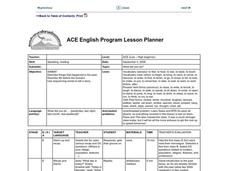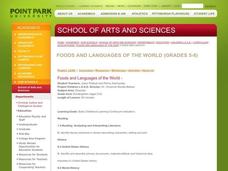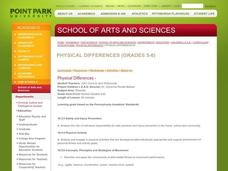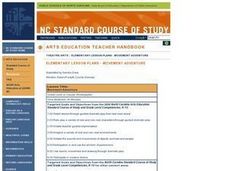Curated OER
Korean Dance
Students examine the various types of dancing present in Korea. In groups, they discover the history and cultural purposes of the dances and how society influenced the role of dance in its culture. They answer discussion questions and...
Curated OER
Hispanic Arts: Visual Arts, Dance and Music
Students observe global cultures by listening to music and watching videos. In this Latin American dance lesson, students define merengue, salsa and other dances from the Hispanic culture while listening to Latin rhythm music. Students...
Curated OER
Chance Dance Compositions
Fourth graders create dances through a randomly generated process (such as throwing a dice) and perform their dances for the class. Class work is based on Merce Cunningham's "Chance Dance" and includes walking, skipping hopping, and...
Curated OER
Dancing Hands, Abstract Drawings
Students discover African musical rhythms by performing Ancestral Spirit Dances. In this musical lesson, students research Willis "Bing" Davis and the abstract work he created. Students listen to Yoruba drum music and...
Bowland
DanceStar
Express dance moves mathematically. Scholars dissect dance routines and express them using mathematical notation, such as translations and rotations. They use video clips to investigate seven different dance genres.
Curated OER
To Travel or Not to Travel: Locomotor andNonLocomotor Movement
Students develop dances. In this movement lesson, students play action and stillness games and learn motif writing symbols that communicate dance moves. Students use locomotor and non-locomotor movement to create their own movement phrases.
Curated OER
What Did You Do?
English learners practice using the past tense by participating in a time description activity. They identify the differences between verbs when they are used to describe current events or past events. Students answer questions using...
Curated OER
Bones
Fifth graders observe real bones and models to learn about the structure and function of the skeletal system. In this skeletal system lesson, 5th graders manipulate objects and models of bones. They handle real bones and determine the...
Curated OER
Who’s on First? Cultural Heritage
Students explore their own heritage as they learn more about Roger Clemente. In this social studies and music lesson plan, students study cultural heritage through a study of Puerto Rican music and instruments.
Curated OER
Foods and Languages of the World
Students study world cultures with an emphasis on languages and cultures. For this world cultures lesson, students study the countries of Spain, China, Italy, and the United States. Students read the story Everybody Cooks Rice and move...
Curated OER
Diversity
Students access prior knowledge of the five senses and relate to students with disabilities. In this people with disabilities lesson, students research and use a Venn diagram to compare and contrast famous people and their...
Curated OER
Clay Sculpture: Relationships
Students explore art history by conducting an in-class activity. In this sculpting lesson, students examine previously created art sculptures in a textbook. Students utilize clay, sculpting tools and grey paper to create their own...
Curated OER
Introduction To Melodic Notation: Sol-Mi
Second graders discover the use of melody in music and how it relates to simple songs and music notation. Students sing and move throughout this lesson. Emphasis is placed upon group and individual practice interpreting musical melodies.
Curated OER
Music and Interdisciplinary Connections
Students examine the interconnectedness of different art forms. They listen to music and watch a video while determining the similarities of the themes. They make connections between books, movies, opera, dance, and music.
Curated OER
Then What Happened?
Students complete activities about the story "Diary of a Worm", by Doreen Cronin. In this reading comprehension lesson, students make predictions and apply prior knowledge about the topic of the story. They actively listen as the book is...
Curated OER
Mexican Charades
Students explore communication by participating in a game of charades. In this visual storytelling lesson, students utilize their acting abilities and physical prowess to communicate Mexican imagery to their classmates without the use of...
Curated OER
Movement Adventure
Students discover movement and pantomime techniques in this adventurous story telling experience for kindergarten. Assessment is done through a short question and answer session and students drawing the "adventure".
Curated OER
Pathways to the Future
Students draw a pathway and create a movement phrase along that same path using specific movement vocabulary. The phrases are performed in class and rubrics are used for assessment. Meets State standards for the arts.
Curated OER
Art Critic for a Day!
Middle schoolers practice evaluating art by creating a research project and presentation. They use the Internet and library to discover a piece of art or artist whom they feel has an impact on the world of art. Next, they create a...
Curated OER
Rhythmic Movement
Explore how waves move in the ocean with your young learners. Fill a two-liter bottle half full with colored water, and have the youngsters move the bottle to make waves inside of it. Then have them listen to the song "Wipe Out"....
Curated OER
The Death of Old Woman Kelema
Students read various parts of "The Death of Old Woman Kelema". Next, they listen to the author's description of her writing process. In groups, they compare and contrast funerals in Mali with those in the United States. They also...
Curated OER
AIR PRESSURE
Sixth graders identify air pressure and how it affects objects. They experiment with one hard boiled egg in a bottle and the affects of air pressure on the egg.
Curated OER
Being in the Noh: An Introduction to Japanese Noh Plays
Students read a Japanese Noh play and discuss its structure and traditional characters. They choose a short myth and write a Noh play based on it.
Curated OER
Fractured Fairy Tales
Students use familiar characters, plots, and settings from traditional fairy tales to create "fractured" versions, while experimenting with satire, irony and parody. A fractured fairy tale is designed to be humorous by changing the story...























